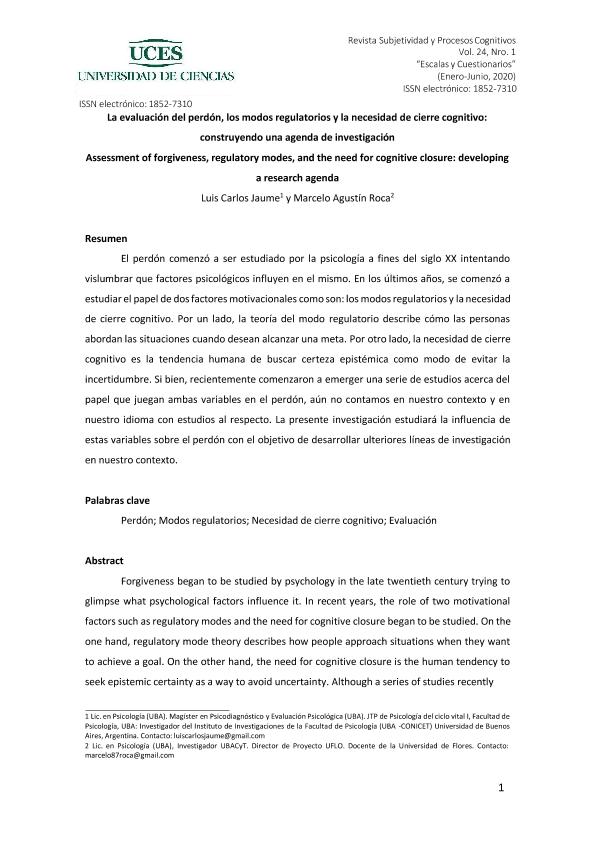Mostrar el registro sencillo del ítem
dc.contributor.author
Jaume, Luis Carlos

dc.contributor.author
Roca, Marcelo Agustin

dc.date.available
2022-09-20T14:39:07Z
dc.date.issued
2020-08
dc.identifier.citation
Jaume, Luis Carlos; Roca, Marcelo Agustin; La evaluación del perdón, los modos regulatorios y la necesidad de cierre cognitivo: Construyendo una agenda de investigación; Universidad de Ciencias Empresariales y Sociales; Subjetividad y Procesos Cognitivos; 24; 1; 8-2020; 1-21
dc.identifier.issn
1666-244X
dc.identifier.uri
http://hdl.handle.net/11336/169588
dc.description.abstract
El perdón comenzó a ser estudiado por la psicología a fines del siglo XX intentando vislumbrar que factores psicológicos influyen en el mismo. En los últimos años, se comenzó a estudiar el papel de dos factores motivacionales como son: los modos regulatorios y la necesidad de cierre cognitivo. Por un lado, la teoría del modo regulatorio describe cómo las personas abordan las situaciones cuando desean alcanzar una meta. Por otro lado, la necesidad de cierre cognitivo es la tendencia humana de buscar certeza epistémica como modo de evitar la incertidumbre. Si bien, recientemente comenzaron a emerger una serie de estudios acerca del papel que juegan ambas variables en el perdón, aún no contamos en nuestro contexto y en nuestro idioma con estudios al respecto. La presente investigación estudiará la influencia de estas variables sobre el perdón con el objetivo de desarrollar ulteriores líneas de investigación en nuestro contexto.
dc.description.abstract
Forgiveness began to be studied by psychology in the late twentieth century trying to glimpse what psychological factors influence it. In recent years, the role of two motivational factors such as regulatory modes and the need for cognitive closure began to be studied. On the one hand, regulatory mode theory describes how people approach situations when they want to achieve a goal. On the other hand, the need for cognitive closure is the human tendency to seek epistemic certainty as a way to avoid uncertainty. Although a series of studies recently began to emerge on the role that both variables play in forgiveness, we do not yet have studies on this in our context and in our language. The presentresearch will study the influence of these variables on forgiveness with the aim of developed further lines of investigation in our context.
dc.format
application/pdf
dc.language.iso
spa
dc.publisher
Universidad de Ciencias Empresariales y Sociales
dc.rights
info:eu-repo/semantics/openAccess
dc.rights.uri
https://creativecommons.org/licenses/by-nc-sa/2.5/ar/
dc.subject
Perdon
dc.subject
Modos regulatorios
dc.subject
Necesidad de cierre cognitivo
dc.subject
Evaluación
dc.subject.classification
Otras Psicología

dc.subject.classification
Psicología

dc.subject.classification
CIENCIAS SOCIALES

dc.title
La evaluación del perdón, los modos regulatorios y la necesidad de cierre cognitivo: Construyendo una agenda de investigación
dc.title
Assessment of forgiveness, regulatory modes, and the need for cognitive closure: Developing a research agenda
dc.type
info:eu-repo/semantics/article
dc.type
info:ar-repo/semantics/artículo
dc.type
info:eu-repo/semantics/publishedVersion
dc.date.updated
2022-09-19T14:55:07Z
dc.identifier.eissn
1852-7310
dc.journal.volume
24
dc.journal.number
1
dc.journal.pagination
1-21
dc.journal.pais
Argentina

dc.journal.ciudad
Ciudad Autónoma de Buenos Aires
dc.description.fil
Fil: Jaume, Luis Carlos. Consejo Nacional de Investigaciones Científicas y Técnicas; Argentina. Universidad de Buenos Aires. Facultad de Psicología. Instituto de Investigaciones; Argentina
dc.description.fil
Fil: Roca, Marcelo Agustin. Universidad de Buenos Aires. Facultad de Psicología; Argentina. Universidad de Flores; Argentina
dc.journal.title
Subjetividad y Procesos Cognitivos
dc.relation.alternativeid
info:eu-repo/semantics/altIdentifier/url/https://publicacionescientificas.uces.edu.ar/index.php/subyprocog/article/view/846
Archivos asociados
